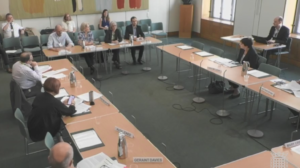On the iCASP office wall, amongst lists of current and developing projects, year planners and maps there is a brightly coloured poster about getting research in to parliament. As iCASP is all about achieving impact from existing environmental science we do a range of activities to ensure iCASP’s work gets into parliament. Below is a summary of some of this activity
A new webpage on the iCASP website details some of our responses to various consultations and inquiries. These vary from the local to the national level and they draw on science right across the iCASP remit. And it isn’t just written evidence. Recently Alison Dunn, who leads our Invasive Non Native Species project, was invited to attend and give oral evidence to the Environmental Audit Committee as part of their Invasive Species inquiry

Environmental Audit Committee oral evidence session as part of the Invasive Species inquiry
Written and oral evidence to inquiries and consultation isn’t the only way that iCASP and the people that work on iCASP projects get research in to parliament.
Another way of getting our work in front of MP’s and their researchers is talking to them directly. Joe Holden Director of iCASP, was recently asked to meet with Alex Sobel MP and brief him on iCASP and the projects we are funding. iCASP has also met with MPs Rishi Sunak and Julian Sturdy out in the Yorkshire Dales to tell them about iCASP.

Every year we invite an MP to give a key note talk at our annual Confluence event, and then plan the agenda to time their arrival to coincide with a break allowing them to talk to a range of people working across different iCASP projects. The Yorkshire catchment that iCASP covers is large so there are a lot of MP’s constituencies meaning the MPs we engage with will have different priorities depending upon constituency location. Many are involved with different select committees, have Ministerial roles or are in the shadow cabinet, or are involved with different APPGs based upon their personal interests. We had Angela Smith MP attend Confluence in 2018 and Alex Sobel joined us this year. This allowed us to engage with them as constituency MPs and also as members of the Environment, Food and Rural Affairs and Environmental Audit Committees respectively.
Networking is another way that our researchers can get iCASP research in to parliament. This might be as simple as attending an event organised for parliamentarians such as the recent IUCN Peatlands meeting in the houses of parliament.
The work of researchers working on iCASP projects gets used in many different ways, one recent example is the report from ONS looking at the natural capital of UK peatlands which drew on the work of several iCASP researchers. Researchers can also act as external reviewers of articles, reports and papers having an input that way. iCASP director Joe Holden was an external reviewer for the recent POSTnote on Wildfires.
And finally, in these days of social media its very easy to get information in front of MPs directly by just responding to their questions, for example Holly Lynch MP recently asked the government about future plans for managing peatland responsibly, we were able to point her in the direction of our optimal peatland restoration work.
This is just a snapshot of some of the activities we’ve been involved with to get research into parliament; it demonstrates the diversity of opportunities available and demonstrates the need for researchers to continually engage with parliament at different levels to ensure their understanding and knowledge is based on the most up to date science available. We have a busy Autumn of consultation responses planned, but it’s worth the effort knowing that this will be influencing policy making and future policies that affect the catchment and all who live here.
